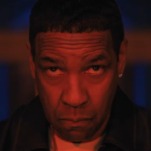Holy Ghost!
A band can face any number of challenges when making a record, but for Alex Frankel and Nick Millhiser, the biggest was simply “finishing.” Despite starting work on a follow-up within a month of their self-titled debut, it’s taken more than two years for the duo, who together comprise the New York-based electro/disco-pop outfit Holy Ghost!, to complete their sophomore LP.
“Nothing really from those sessions actually ended up on the record,” Frankel says, speaking to Paste via phone on an August afternoon. The pair worked off and on throughout 2011, but it wasn’t until the beginning of 2012—after touring for the first record was complete—that the album began to actually take shape.
“We knew we wanted to do stuff differently on the second record,” Frankel says, “and we had a bit more facility with the equipment and the recording process, and probably the songwriting too.” Where the first record was largely a learning process, Dynamics—out next week via DFA Records—aims to be more immediate, personal and in-tune with the things the duo really loves.
“On the first record,” Millhiser continues, “it felt like we were trying to cram every idea and reference we could into every single song. It seemed cool at the time, but when we were done and able to take a step back from it, we realized that with this one we wanted things to be painted in clearer, broader strokes.”
The effort is clear. Dynamics is filled with songs that individually feel more defined. Take “Dumb Disco Ideas,” the album’s eight-minute dancefest of a lead single: “We said: if we were doing something that referenced the remixes that we do,” Millhiser describes, “we should just go for it and make it as long and weird as possible.”
With that aim of weirdness in mind, Frankel and Millhiser often rely on vintage instruments to achieve their particular brand of dance pop. Right around the time the duo began working on the record, they attained a Yamaha CS80, one of the first polyphonic—meaning it can play multiple notes at the same time—synthesizers to be produced.
“One of the annoying things about most keyboards is there’s no aftertouch,” Frankel explains. “With the CS80, you can dig into a chord after you’ve struck it and control a variety of things. It’s more expressive—it’s a symphonic ability, but a symphonic ability from 1978.”
A recurring theme on the album is an ascending or descending sweeping sound, particularly noticeable on the opening track “Okay.” Frankel says that sound comes from the CS80’s ribbon controller, which allows for pitch shifts. “It’s a pretty incredible instrument,” he continues, “and one that Nick and I have been talking about for 15 years. So, to actually have it now, I think we used it on every track on the record.”
But while the CS80 is a blessing in the studio, it creates an absolute nightmare when it comes to touring. “I dream of being able to tour with it,” Millhiser says, “It would sound incredible over a big PA. But it weighs 250 pounds, and if you look at it funny it’ll go out of tune—basically you’d need a crew of five people just to look after that one keyboard.”
This creates a particularly interesting challenge, as Holy Ghost! fully performs their songs live on stage. The issue is twofold. Firstly, they must they find a way to recreate the music with instruments they can actually put in a case and trust the TSA not to destroy. But even then, the songs are layered extensively in the studio—impossible to recreate on stage with only two people.
“Once the record’s done,” Millhiser says, “inevitably that often results in us being like: ‘OK, shit, now we have to figure out how to play this live.’”
-

-

-

-

-

-

-

-

-

-

-

-

-

-

-

-

-

-

-

-

-

-

-

-

-

-

-

-

-

-

-

-

-

-

-

-

-

-

-

-








































